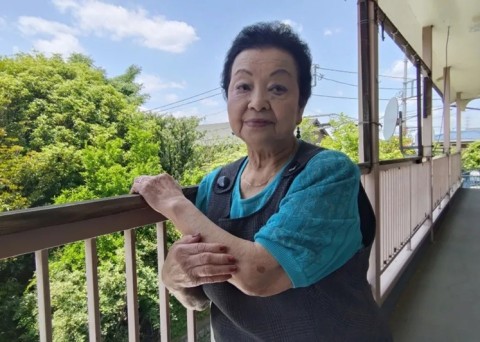The Beginning of an Ordinary Life
Yuko Ogasawara was born in Yokohama, Japan, in 1938 a time when the world stood on the edge of war. Her childhood unfolded against the backdrop of sirens, shortages, and the quiet resilience of a generation that learned to survive more than to dream.
Her father worked for an insurance company, a modest but stable job that kept the family afloat during Japan’s post-war rebuilding years. Her mother stayed at home, raising Yuko in the traditional values of obedience, hard work, and humility. Yet even as a young girl, Yuko felt a quiet restlessness.
In later interviews, she recalled the bombers she had seen as a child “B-29s in the sky, the sound of the siren, the fear that Tokyo might disappear.” That fear, she said, taught her the value of courage and endurance. Life after the war was not romantic; food was scarce, people bathed in rivers shared with animals, and the concept of “luxury” was foreign. But these experiences planted in her something stronger than comfort: resilience.
After high school, she followed her father’s path and found work at an insurance company in Tokyo. Her early adult life mirrored the quiet, predictable routine of so many Japanese women of her generation work, marriage, motherhood. At twenty-four, she married a man who had once played football for Kyoto University. They settled down, built a family, and raised three children two sons and a daughter.
Marriage, Motherhood, and the Cage of Respectability
To the outside world, Yuko’s life looked ideal. A stable marriage, three healthy children, a husband with a good job. But inside the household, the dynamic was different. Her husband was, by her own description, strict and controlling. He believed that a wife should remain at home, should not drink, should not go out. Yuko followed these unspoken rules for decades.
“I lived without freedom,” she later said, without anger just a quiet statement of fact.
That confinement shaped her character in paradoxical ways. She became disciplined, patient, and emotionally restrained. But beneath that surface, something waited an unexpressed part of her personality that would, much later in life, demand to be seen.
When her husband died at fifty-nine from liver failure, Yuko found herself widowed, alone, and suddenly unbound by the rules that had defined her entire adult life. It was a loss but also a release. For the first time in decades, she could make her own decisions.
At sixty-one, instead of retreating into quiet retirement, she opened a small hostess bar in Tokyo. There, among the laughter, music, and nighttime conversations with customers, she began to rediscover her sense of self not as a wife or mother, but as a woman.
The Unexpected Invitation
It was in that bar that fate intervened. One of her customers worked in Japan’s adult video (AV) industry. He mentioned that there was a growing demand for “mature actresses” women in their fifties, sixties, even seventies as part of the jukujo genre, which celebrates older women’s beauty and sensuality.
At first, Yuko laughed. She thought the idea absurd. But curiosity lingered. When she later saw that the industry often paired older women with younger men, she asked herself a question that changed everything:
“Why shouldn’t I stay young too?”
In 2016, when most of her peers were long retired, Yuko Ogasawara stepped onto a film set for the first time. She was seventy-eight. Her debut role was that of an ordinary housewife a character who, ironically, reflected her own life but this housewife’s story was charged with intimacy and desire. The shoot was awkward at first, but Yuko approached it with humor and grace.
“I was nervous,” she said later, “but when I saw the handsome young actor, I thought well, maybe I can still be beautiful.”
That first film did more than introduce her to the industry; it gave her a second youth.
Becoming a Symbol of Late Freedom
After her debut, Yuko continued to film. Over the following years, she appeared in around ten productions, becoming a quiet sensation in Japan’s “silver porn” market an industry that caters to an aging population where both performers and audiences are older than the mainstream standard.
Japan’s demographics explain part of the story: nearly 30 % of its citizens are over sixty-five, and the culture’s unique openness to niche adult genres allowed for Yuko’s unlikely rise. Yet numbers alone don’t explain her popularity. Yuko didn’t become a media topic merely because she was old; she became one because she was authentic.
She never pretended to be younger than she was. She didn’t dye her hair jet black or chase cosmetic illusions. Instead, she embraced her wrinkles and her age as symbols of experience. On screen, she appeared calm, kind, and natural qualities rarely associated with pornography, yet deeply human.
Her performances felt less about lust and more about connection. That difference made her stand out. Viewers didn’t just watch her; they rooted for her.
Life During the Pandemic
When the COVID-19 pandemic hit Japan in 2020, Yuko’s filming schedule stopped abruptly. She gave interviews from her small Tokyo apartment, saying that she missed the work.
“I want to keep working,” she told reporters. “But the company said we must wait because of the coronavirus.”
Even during isolation, she kept exercising daily gentle stretches and back exercises to maintain posture and flexibility. “If there were a shoot tomorrow,” she said, “I’d be ready.”
Those words summed up her attitude toward life: preparation, perseverance, and optimism.
The pandemic slowed her, but it didn’t silence her. She appeared in television interviews, news articles, and documentaries often described as “the world’s oldest porn star.” Yuko herself never liked that label. For her, age was just a number, not an identity.
“I don’t do this to be called the oldest,” she said, “I do it because it makes me feel alive.”
The Philosophy of a Survivor
To understand Yuko Ogasawara, one must understand Japan’s post-war generation a people forged by scarcity and silence. For decades, Japanese women were expected to embody modesty, loyalty, and endurance. Yuko fulfilled that role to perfection. Then, in her eighties, she rewrote the rules.
Her story isn’t about pornography in the superficial sense; it’s about reclaiming identity. For her, acting in adult films became an act of rebellion against invisibility a way of saying “I’m still here.”
She once said, “Those who lived through war are disappearing. I’m one of the last, and maybe that’s why I have a strong heart.”
Her courage lies not only in her decision to appear nude on camera at eighty, but in the deeper act of confronting shame, judgment, and expectation especially in a culture that values discretion above all.
A New Kind of Beauty
In Japan, the jukujo category literally “mature woman” is often portrayed with warmth and dignity. Yuko embodied that archetype in a way that went beyond fantasy. She represented the kind of beauty that survives time: quiet confidence, kindness, and experience.
When asked how she prepares for her scenes, she laughed: “I eat well, I stretch, and I don’t worry too much.”
That simple wisdom resonated far beyond her films. Many older women in Japan began to write to her, expressing admiration. Some said she gave them courage to feel attractive again. Others thanked her for reminding them that age doesn’t erase desire.
In her later interviews, Yuko admitted she was surprised by how positive the response was. “People think it’s strange,” she said, “but maybe they see that it’s just another form of living honestly.”
The Cultural Impact
Yuko Ogasawara’s rise coincided with Japan’s growing fascination with “silver porn” a genre reflecting an aging society’s evolving relationship with sexuality. Her presence gave the movement a face, one that was both grandmotherly and rebellious.
She challenged not only ageism but also the hypocrisy of how society views intimacy. “Old people are expected to fade quietly,” wrote one columnist in Tokyo Reporter, “but Yuko refuses to disappear.”
That nuance made her legacy more than tabloid trivia it made it cultural commentary.
The Present Day
As of her mid-eighties, Yuko continues to live independently. She rarely appears in new films now, but she has not officially retired. When journalists ask if she plans to quit, she smiles: “Not yet. Maybe when my body says so.”
Her children, by most accounts, maintain polite distance. She understands their discomfort, but she doesn’t regret her choices. “I raised my children. I did my duty. Now I live for myself,” she said once.
That simple statement encapsulates the quiet revolution of her life after decades of living for others, she finally lives for herself.
Beyond the Label of “Porn Star”
It would be easy to reduce Yuko’s life to a headline “World’s Oldest Porn Actress” but that misses the essence of who she is. She is not famous for shock value; she is remarkable because of her integrity.
In a world obsessed with youth, she reminds us that beauty is not a possession of the young, and sexuality does not have an expiration date. Her films may be classified as adult entertainment, but her story speaks to something universal: the human need for connection, for purpose, for self-expression.
She lived a traditional life, endured its limitations, and then when society least expected it rewrote her story.
A Quiet Legacy
Today, Yuko Ogasawara remains a symbol of courage, freedom, and unfiltered humanity. She may not have starred in hundreds of films, but the few she made left a disproportionate impact. Her presence broke taboos and opened conversations about aging, loneliness, and female autonomy.
Her life challenges the idea that a woman’s story must end with motherhood or widowhood. It suggests that reinvention is always possible whether you are thirty or eighty-three.
Perhaps the most powerful lesson she leaves behind is the simplicity of her attitude. When asked once if she considered herself brave, she smiled softly and said:
“I’m not brave. I just decided not to stop living.”













